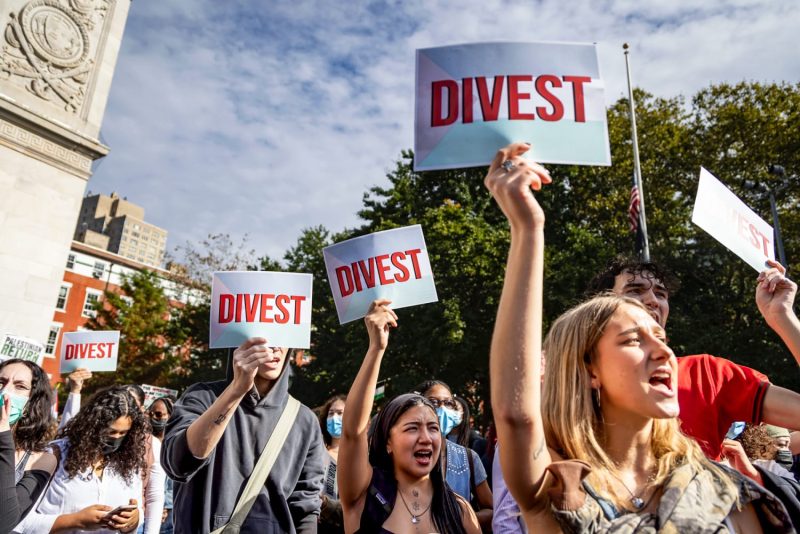In addition to a cease-fire in Gaza, protesters on college campuses across the country are calling on their schools to divest from all financial support of Israel.
Divestment usually refers to selling shares in companies doing business with a given country. Divestment has long been a goal of a movement that seeks to limit what it considers hostile operations by Israel and an end to expanding what the United Nations has ruled are illegal settlements.
Now, college protesters are hoping to force their universities to divest to put financial pressure on companies doing business in Israel to meet those two objectives.
“The university should do something about what we’re asking for, about the genocide that’s happening in Gaza,” said Columbia University student and protest leader Mahmoud Khalil, who is Palestinian, and noted that students have been pushing for Columbia to divest from Israel since 2002. “They should stop investing in this genocide.”
Israel launched its Gaza campaign soon after the Oct. 7 attack by Hamas, a U.S.-designated terror group that left 1,200 Israelis dead, according to officials, with an estimated 250 people taken hostage. The subsequent military response by Israel has killed more than 34,000 Palestinians, according to the Gaza Health Ministry.
Like many universities, Columbia owns shares of various companies as part of its financial operations and endowment. However, information on Columbia’s exact holdings was not immediately available, and it was not clear whether investment information published by Columbia University Apartheid Divest (CUAD), the group leading the protests at the school, was accurate.
Whatever the case, while some of the shares Columbia owns may be directly held stock investments, other assets are likely held indirectly through investment instruments like mutual funds or exchange-traded funds (ETFs) that are designed to expose investors to a variety of firms.
And as students at Brown University acknowledged in a separate proposal targeting their school’s alleged Israel-tied investments, excluding specific investments from these indirect stock holding products “would be logistically challenging.”
In fact, they concluded that none of their school’s current direct investments appeared to be in individual companies violating its anti-Israel screening criteria.
Meanwhile, mutual fund and ETF holdings are constantly changing, the Brown students said.
The actual mechanics of divestment thus make it a more difficult undertaking than it may first appear, said Alison Taylor, clinical associate professor at New York University’s Stern School of Business.
“You get into questions of, ‘What percentage of a company’s business is actually tied to the activities in question?’” Taylor said.
Columbia’s Investment Management Company, which oversees the school’s market assets, does have an advisory committee on socially responsible investing.
This committee has pledged that it will screen against investing in firms that operate private prisons; derive significant revenues from thermal coal; and engage in tobacco manufacturing. It also has had a policy against investing in companies doing business in Sudan.
So there is precedent for Columbia to limit its financial exposure to socially irresponsible firms, CUAD says. At present, Columbia’s investment in the companies that CUAD accuses of having ties to Israel makes it “complicit in genocide,” CUAD says.
“By withdrawing from holdings that profit off of Israeli human rights violations, Columbia can invest in other, more worthwhile companies,” CUAD says in a December proposal submitted to the socially responsible investing committee calling for divestment.

